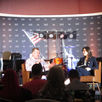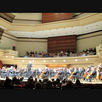Lyric Opera’s The Barber of Seville wraps Chicago with humor and joy
- Oct 16, 2019
- 6 min read
This must-see production started Lyric’s 65th season and offers three more performances on Friday, Oct. 18, Monday, Oct. 21, and Sunday, Oct. 27.

Adam Plachetka, Marianne Crebassa and Lawrence Brownlee in Lyric's The Barber of Seville. Photo by: Todd Rosenberg
“Every kind of music is good, except the boring kind,” said Italian composer Gioachino Rossini. Famous for his comic operas, Rossini knew what he was saying. His music has been bringing the feelings of happiness, festivity and joy for two hundred years already, and The Barber of Seville is a great example of it. Lyric Opera of Chicago successfully opened its 2019-2020 season with this must-see operatic chef-d'oeuvre with three more performances left. They will take place at 7 p.m. on Friday, October 18, 7 p.m. on Monday, October 21, and 2 p.m. on Sunday, October 27 at Lyric’s spectacular Ardis Krainik Theatre.
“Barber captivates audiences all over the world thanks to its effervescent music, matched by its irresistible wit,” wrote Lyric’s General Director, President and CEO Anthony Freud and Chairman David T. Ormesher in Lyric Notes. “That’s no surprise, since Gioachino Rossini is opera’s greatest musical comedian. It’s impossible to leave a performance of this opera without a smile. In every brilliant aria and ensemble Barber’s energy, virtuosity, and sparkle combine to make it the most popular and best-loved of all operatic comedies.”
Lyric Opera of Chicago found a great way to present this masterpiece to its audiences. A beautiful and extremely talented international cast, an amazing orchestra under the directorship of Sir Andrew Davis, Rossini's glorious music, and endless humor in every note, word and movement – these are the main characteristics of Lyric’s glorious production revival of Rossini’s The Barber of Seville.

Marianne Crebassa and Alessandro Corbelli. Photo by: Todd Rosenberg
From the first notes of its famous overture, the audience feels the joy and happy mood of Rossini’s playful and glorious melodies that make this overture a masterpiece that is frequently performed separately from the opera. Sir Andrew Davis, who has a special skill to feel the energy and the message that composers put in their music, caught the vibe of Rossini’s enthusiasm, humor and joking attitude and brilliantly transferred it to the Lyric Opera Orchestra. On Friday, October 18, the orchestra will perform this masterpiece under the baton of talented Italian-born conductor Stefano Sarzani, who was previously seen at Lyric conducting La boheme during the season of 2018-2019.
Interestingly, Rossini wrote the overture three years earlier than the opera itself, which was written in 1816 when the composer was only 24. Historians say that the original overture to The Barber of Seville was lost shortly after the disastrous premiere that took place in Rome in February 1816. Rossini chose to replace it with one he had written for an earlier opera; therefore the overture contains none of the music from the actual opera. However, this overture still organically embeds into Rossini’s The Barber of Seville and carries the same lighthearted mood and endless joy.
This two act Commedia is based on libretto by Cesare Sterbini after the play of the same name by Pierre-Augustin Caron de Beaumarchais. The intriguing love story unfolds in a place called Seville in Spain in the late 18th century. Handsome Count Almaviva falls in love with young pretty Rosina, who is kept locked up at home by her grumpy old guardian Bartolo. The old man plans to marry her, while Almaviva disguises himself as poor Lindoro to make sure that Rosina falls in love with him, not his title. He serenades her at dawn and steals her heart. Meanwhile, Bartolo controls her every step and doesn’t let anyone enter the house besides Don Basilio, Rosina’s music teacher.
The poor girl feels trapped and unhappy. It would have been a sad story, but Figaro, a famous Seville barber, helps the young lovers and eventually settles the situation. This smart and cunning barber helps Almaviva by using clever and sly tricks to deceive Bartolo, and after numerous challenging, yet funny, situations the Count and Rosina get married. Old Bartolo accepts it and gives the couple his blessing.
The Barber of Seville was first performed by Lyric Opera of Chicago in November 1954. During the season of 2013-2014, Lyric wowed its audiences with an original production of this famous opera, and now it brings to stage a revival of this production. It was created by a terrific team of Tony Award winners: director Rob Ashford, set designer Scott Pask, costume designer Catherine Zuber, and lighting designer Howard Harrison. Tara Faircloth is the revival director. This great team of highly skilled professionals approached this opera with a smart and reasonable thought: just because it premiered in 1816, it doesn’t mean that it won’t resonate with audiences in 2019! And they were right! Audiences have been thrilled by Lyric’s magnificent production of this operatic masterpiece.
The carefully selected international cast of this glorious production revival deserves a special round of ovations and applause. The artists came from different countries and have different backgrounds, but together they create a beautiful ensemble with breathtaking duets, trios, quartets, and quintets. Certainly, each solo presented by these talented singers constitutes a piece of art, and the members of the Lyric Opera Chorus prepared by Michael Black support the leading actors with enthusiasm and extreme mastery.

Adam Plachetka in Lyric's The Barber of Seville. Photo by: Todd Rosenberg
The role of Figaro is brilliantly presented by accomplished Czech bass-baritone Adam Plachetka. An outstanding singer and actor, Plachetka finds the best way to demonstrate Figaro’s energetic and merry personality. His flexible strong voice, excellent vocal articulation, sense of humor, mimics and body language make him a perfect fit for this role. Being a priceless comedian, Plachetka is funny and charming every time he appears on stage, starting with Figaro’s famous aria “Largo al factotum,” which gives the audience members both goosebumps and the feeling of joy. Plachetka has already played Mozart’s Figaro at Lyric, and now Rossini’s version gives him even more opportunities to show his comic talent.
Being admired by audiences from all over the world, American tenor Lawrence Brownlee presents the passionate and extremely attractive Count Almaviva. The Count is the central figure in this operatic work, despite its title, and Brownlee has a great responsibility to vocally and artistically unfold the intriguing story of a smart and inventive young Count, who eventually achieves his goal and marries Rosina. Brownlee is fabulous in every possible way, whether singing long and touching musical phrases in “Ecco ridente in cielo,” playful and full of intriguing passages “Oh! sorte! gia veggo,” or melodically rich and artistically demanding “Se il mio nome saper.” Brownlee has made his reputation internationally as one of the greatest Rossini interpreters of our time, and Almaviva is one of his signature roles. As Almaviva disguises himself during the opera, Brownlee has a great opportunity to demonstrate his multifaceted vocal talent.
Marianne Crebassa presents the role of the spirited Rosina. From the first seconds of her appearance on the stage the audience immediately falls in love with this charming, skillful and extremely talented French mezzo-soprano. Her beauty, vocal talent and bright artistic presentation captivate everyone’s attention. She sings long and complicated arias, such as touching “Una voce poco fa” and playful “Io son docile” with elegance and power, showing her extreme vocal skills and the brilliance of her timbre. Marianne’s long notes demonstrate excellent breathing technique, and her sense of humor is seen in every note, move and facial expression. Crebassa’s truly effervescent stage personality and alluring voice make her an excellent fit for this role.
World-renowned Italian baritone Alessandro Corbelli presents the role of the pompous Doctor Bartolo. Although this role theoretically should raise negative feelings in the audience, the way Corbelli presents Bartolo makes everyone fall in love with this old man who despite his age wants to win the heart of a young and beautiful woman. Being an incomparable comedian whose face tells everything without any words, Alessandro also wows the audience members with his superb voice and unbelievable vocal articulation, such as in “A un dottor de la mia sorte.” This really difficult aria has unbelievably fast parts, which Alessandro presents in a brilliant manner and deeply impresses the audience! Long regarded all over the world as the finest comic actor in Italian opera, Corbelli handles rapid-fire Rossinian patter with brilliance and mastery.
The terrific young Polish bass Krzysztof Bączyk debuts as the whiny music master Don Basilio. The talent of this outstanding soloist is shining all over Europe, and now America is falling in love with his incredible voice and outstanding artistic skills. He is a great comedian, and his outstanding presentation shines brightly at the Lyric stage and complements the talents of all other singers. The role of Berta, Doctor Bartolo's maid, is beautifully presented by American soprano Mathilda Edge, who is a first-year Ryan Opera Center member. With such an inspired cast of singers, of course this production is a success!
For tickets, please go to https://www.lyricopera.org/Barber or call 312-827-5600. Tickets start at $49 for adults and just $20 for children. Lyric Opera House is located at 20 N. Wacker Drive in Chicago.
Natalia Dagenhart

Natalia Dagenhart really enjoyed Lyric's The Barber of Seville! Photo: Courtesy of Natalia Dagenhart

























Comments